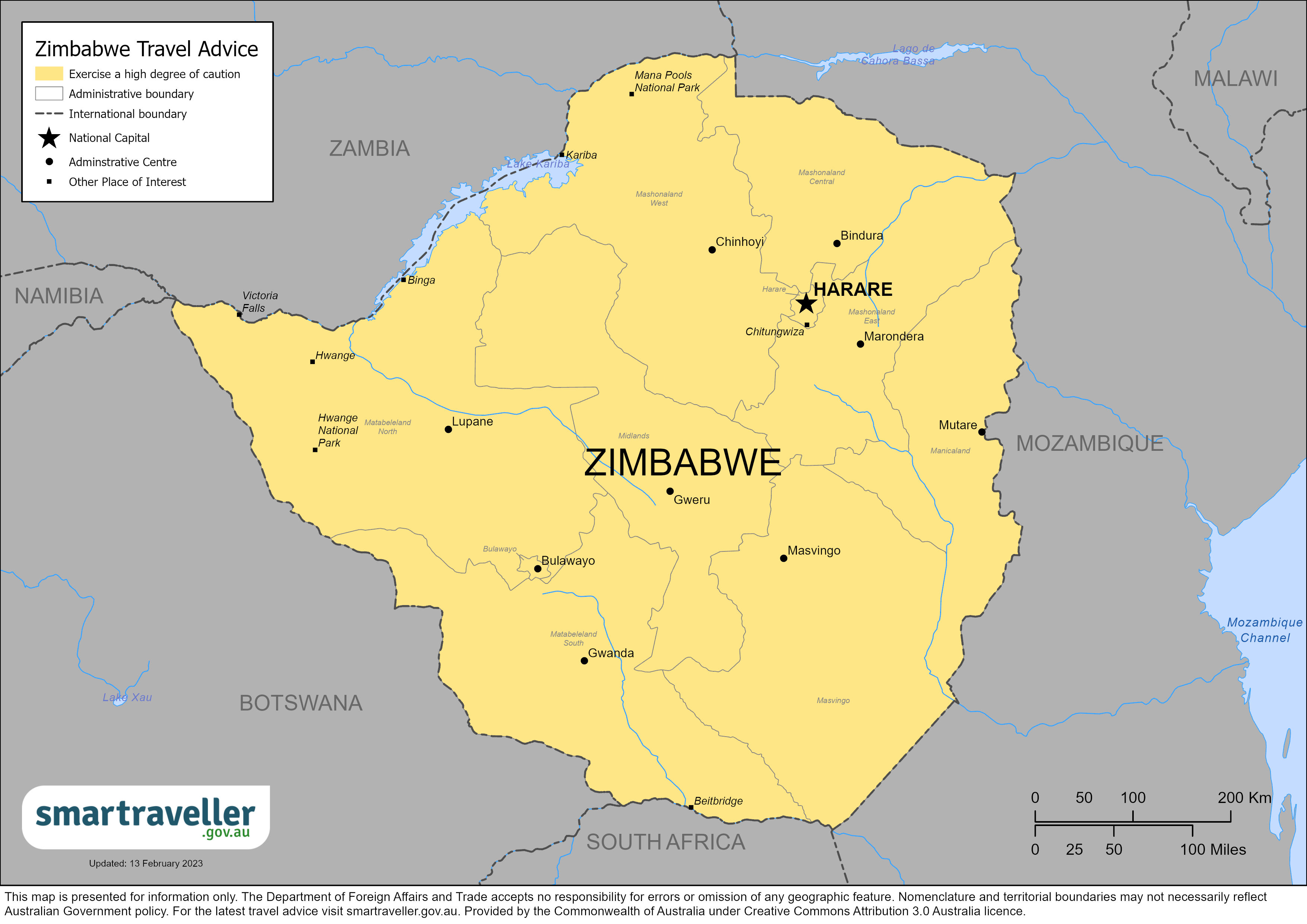Essential services
Disruptions to power and water are common and can last for weeks, including in cities. Mobile phone reception and data can also be unreliable.
Landmines
Parts of the country have unexploded landmines, mainly in:
- the border area with Mozambique
- the Lupane District in Matabeleland North Province
The Zimbabwe Government has a national program to locate and remove landmines.
Stick to main roads and paths in areas where landmines could exist.
Driving permit
To drive in Zimbabwe, you need both:
- a valid Australian driver’s licence
- an International Driving Permit (IDP)
Get your IDP before leaving Australia.
Road travel
Road travel is very dangerous in Zimbabwe. Traffic lights rarely function, leaving drivers to navigate intersections and road crossings by themselves.
Hazards include:
- reckless and dangerous driving habits
- poorly maintained roads full of potholes in both city and country areas
- unmarked speed humps
- poorly maintained vehicles, including a high number of commuter vans overburdened and unroadworthy by Australian standards
- roadblocks requiring detours
- poor or no street lighting or signage
- unlit or poorly lit vehicles at night
- animals on roads
Flash flooding during the rainy season can make roads impassable from November to March.
Driving laws
All vehicles must carry the following:
- a fire extinguisher
- 2 metallic emergency triangles with white reflective stickers on the front and red reflective stickers on the back
- a spare wheel
- wheel spanner
- a jack
If your vehicle isn’t fully equipped, authorities could fine you.
It’s illegal to use a phone without a hands-free device when driving.
Local driving
Fuel shortages can occur. Keep your tank topped up and carry sufficient fuel for long journeys. You may need to check if international credit/debit cards will be accepted when purchasing fuel.
If you plan to drive:
- check your insurance covers you and your vehicle
- learn local traffic laws and practices
- ask locally about fuel availability and road conditions, such as security risks and road closures not only in Zimbabwe but in any bordering provinces of neighbouring countries that you may cross into
If you hire a vehicle, make sure it’s equipped with all compulsory safety equipment.
While driving:
- take a mobile phone or another communication device with you
- carry a medical kit
- always be alert to possible hazards
- avoid travelling on roads outside of major centres at night due to limited lighting and poor road conditions
- avoid rural roads at night
- do what local authorities say, including at roadblocks
More information:
Motorcades
By law, all vehicles must stop and pull over when the President’s motorcade goes past. You must stop even if you’re on the opposite side of the road on a dual carriageway.
Motorcades usually begin with a single police motorcycle with flashing lights. Security forces sometimes intimidate or assault motorists who don’t stop in time.
Roadblocks
Police roadblocks can appear with little warning. If asked, you must show police your identification documents, car registration and ownership papers.
Police may also ask to see your car’s safety equipment.
Police may ask drivers to pay on-the-spot fines or a bribe. If you pay a bribe, they could demand more.
Motorcycles
Check if your travel insurance policy covers you for the vehicle you intend to ride. You might need extra cover for an accident on a motorbike, quad bike or similar vehicle.
Always wear a helmet.
Taxis
Use only registered taxis and limousines. If possible, book them through your accommodation.
Public transport
Avoid using public transport, including trains, buses and commuter buses (combis). They present safety concerns due to overcrowding, poor maintenance and reckless driving.
Boat travel
Accidents have occurred on passenger ferries and boats.
Use transport providers with a good reputation.
Always wear a life jacket, even if others don’t.
Air travel
Airlines can change or cancel flights at short notice. You can book charter flights through private companies.
The European Union (EU) has banned Air Zimbabwe flights to the EU. Australian Embassy staff are not permitted to use Air Zimbabwe for official travel except in exceptional circumstances.
DFAT doesn’t provide information on the safety of individual commercial airlines or flight paths.
Check Zimbabwe’s air safety profile with the Aviation Safety Network.
More information:
Hunting
Zimbabwe has hunting rules.
Risks include landmines in some areas.
If you plan to do guided hunting, engage an operator with a good reputation and a valid hunting licence.
Before you hunt, research the rules and requirements of the Convention on International Trade in Endangered Species (CITES).

